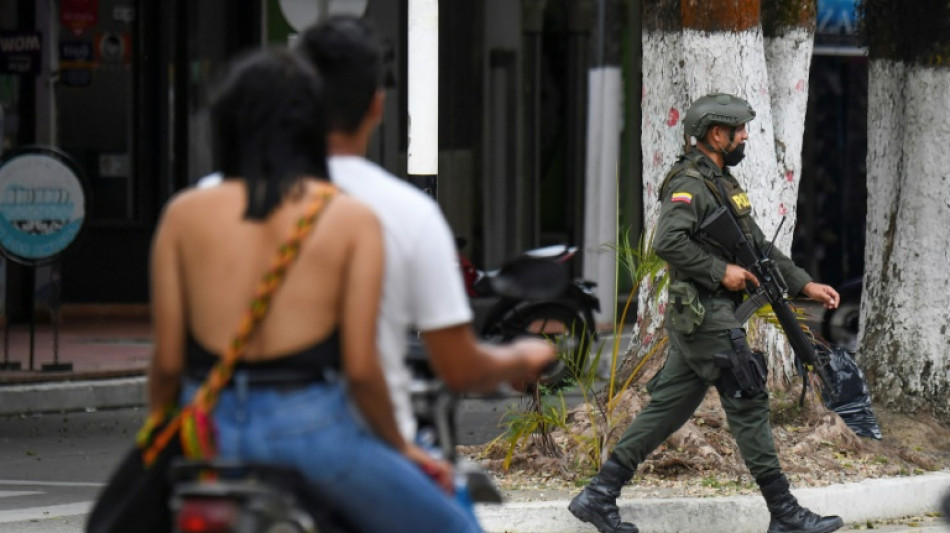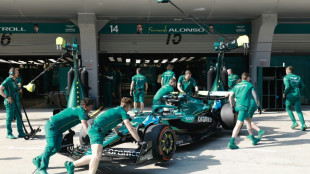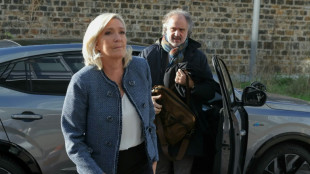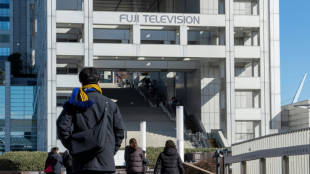
-
 Aston Martin to sell stake in Formula One team
Aston Martin to sell stake in Formula One team
-
Three talking points ahead of clay-court season

-
 French court hands Le Pen five-year election ban
French court hands Le Pen five-year election ban
-
Probe accuses ex J-pop star Nakai of sexual assault

-
 Japan leads hefty global stock market losses on tariff woes
Japan leads hefty global stock market losses on tariff woes
-
Saka 'ready to go' after long injury lay-off: Arteta

-
 Ingebrigtsen Sr, on trial for abusing Olympic champion, says he was 'overly protective'
Ingebrigtsen Sr, on trial for abusing Olympic champion, says he was 'overly protective'
-
Tourists and locals enjoy 'ephemeral' Tokyo cherry blossoms

-
 Khamenei warns of 'strong' response if Iran attacked
Khamenei warns of 'strong' response if Iran attacked
-
France fines Apple 150 million euros over privacy feature

-
 UK PM urges nations to smash migrant smuggling gangs 'once and for all'
UK PM urges nations to smash migrant smuggling gangs 'once and for all'
-
Thai authorities probe collapse at quake-hit construction site

-
 France's Le Pen convicted in fake jobs trial
France's Le Pen convicted in fake jobs trial
-
Chinese tech giant Huawei says profits fell 28% last year

-
 Trump says confident of TikTok deal before deadline
Trump says confident of TikTok deal before deadline
-
Myanmar declares week of mourning as hopes fade for quake survivors

-
 Japan's Nikkei leads hefty market losses, gold hits record
Japan's Nikkei leads hefty market losses, gold hits record
-
Tears in Taiwan for relatives hit by Myanmar quake

-
 Venezuela says US revoked transnational oil, gas company licenses
Venezuela says US revoked transnational oil, gas company licenses
-
'Devastated': Relatives await news from Bangkok building collapse

-
 Arsenal, Tottenham to play pre-season North London derby in Hong Kong
Arsenal, Tottenham to play pre-season North London derby in Hong Kong
-
Japan's Nikkei leads hefty equity market losses; gold hits record

-
 Israel's Netanyahu picks new security chief, defying legal challenge
Israel's Netanyahu picks new security chief, defying legal challenge
-
Trump says US tariffs to hit 'all countries'

-
 Prayers and tears for Eid in quake-hit Mandalay
Prayers and tears for Eid in quake-hit Mandalay
-
After flops, movie industry targets fresh start at CinemaCon

-
 Tsunoda targets podium finish in Japan after 'unreal' Red Bull move
Tsunoda targets podium finish in Japan after 'unreal' Red Bull move
-
French chefs await new Michelin guide

-
 UK imposes travel permit on Europeans from Wednesday
UK imposes travel permit on Europeans from Wednesday
-
At his academy, Romanian legend Hagi shapes future champions

-
 Referee's lunch break saved Miami winner Mensik from early exit
Referee's lunch break saved Miami winner Mensik from early exit
-
Djokovic refuses to discuss eye ailment after shock Miami loss

-
 Mitchell magic as Cavs bag 60th win, Pistons and T'Wolves brawl
Mitchell magic as Cavs bag 60th win, Pistons and T'Wolves brawl
-
Mensik shocks Djokovic to win Miami Open

-
 Duterte lawyer: 'compelling' grounds to throw case out
Duterte lawyer: 'compelling' grounds to throw case out
-
What happens on Trump's 'Liberation Day' and beyond?

-
 Clock ticks on Trump's reciprocal tariffs as countries seek reprieve
Clock ticks on Trump's reciprocal tariffs as countries seek reprieve
-
Japan-Australia flagship hydrogen project stumbles

-
 Musk deploys wealth in bid to swing Wisconsin court vote
Musk deploys wealth in bid to swing Wisconsin court vote
-
Mensik upsets Djokovic to win Miami Open

-
 China manufacturing activity grows at highest rate in a year
China manufacturing activity grows at highest rate in a year
-
'Waited for death': Ex-detainees recount horrors of Sudan's RSF prisons

-
 Japan's Nikkei leads big losses in Asian markets as gold hits record
Japan's Nikkei leads big losses in Asian markets as gold hits record
-
Rescue hopes fading three days after deadly Myanmar quake

-
 'Basketbrawl' as seven ejected in Pistons-Wolves clash
'Basketbrawl' as seven ejected in Pistons-Wolves clash
-
Four men loom large in Microsoft history

-
 Computer pioneer Microsoft turns 50 in the age of AI
Computer pioneer Microsoft turns 50 in the age of AI
-
Trump calls out both Putin and Zelensky over ceasefire talks

-
 Kim Hyo-joo tops Vu in playoff to win LPGA Ford Championship
Kim Hyo-joo tops Vu in playoff to win LPGA Ford Championship
-
Economy and especially Trump: Canadians' thoughts on campaigns


Warring guerrillas bring misery to Colombian region
Fear reigns in northeastern Colombia on the border with Venezuela where the local population has been caught in the crossfire of rival warring groups of left-wing guerrillas.
Since the start of the year, the National Liberation Army (EL), Colombia's last recognized guerrilla group, and dissidents of the Revolutionary Armed Forces of Colombia (FARC) rebels that laid down arms and signed a 2016 peace deal with the government, have waged a merciless battle in Arauca.
"What is in play is territorial control of the department and multiple trafficking with neighboring Venezuela," on the other side of the Arauca river, a political scientist based in the region who spoke on condition of anonymity, told AFP.
Almost 50 people have been killed in the violence in less than four weeks.
Murders, kidnappings and threats have become a daily occurrence.
A shocking car bombing outside a building housing social organizations on January 19 marked an escalation of violence. FARC dissidents were blamed for the attack.
Simeon Delgado, a 45-year-old security guard and father of three, was killed in the explosion.
"This damn war took him from us. A war we didn't ask to be a part of, we have nothing to do with this conflict," said his sister Alba.
- Devoured by corruption -
At least a dozen deaths were registered in the last week of January.
The modus operandi is almost always the same: gun-totting hitmen on motorbikes who disappear as quickly as they appeared.
"Every day they kill. Often we don't even know why. How could you not be afraid?" said Andres Prada, an indigenous leader.
The conflict revolves around a "triangle of death" area alongside the Arauca river.
The Arauca region is as large as Belgium but sparsely populated. Its economy is driven by the Cano Limon oil field that is heavily guarded by soldiers, as well as agriculture and contraband.
Arauca is "devoured by corruption, and a border region that is a goldmine for guerrillas," said one source, also under the condition of anonymity.
"Everything is transported by the river: people, merchandise and, of course, drugs."
If it was not for some menacing graffiti on walls and nervous-looking soldiers, there would be an air of normality in Arauca.
"No-one is fooled, everyone is spying on everyone else," said a former soldier, now working as a driver.
Bikers don't use helmets "the guerrillas don't allow it" so they can keep an eye on who is moving about.
While some people speak to reporters, no one wants to give their names out of fear.
"If you give my name, tomorrow I will be a corpse," said the family member of one victim.
- Curfew -
On the shores of the river, where Venezuelans with their arms full of goods arrive, the sight of an unknown face causes immediate suspicion.
People surreptitiously take the person's photo with their mobile phones.
Local authorities have imposed a nighttime curfew and FARC dissidents have also banned anyone from moving around after 7:00 pm.
That FARC influence is new, though.
Arauca is a traditional ELN fiefdom where the rebels impose their rules and "revolutionary" tax.
"Nothing happens without the consent of the ELN, which benefits from considerable income from organized extorsion and the oil wells," said the political scientist.
"Everyone pays, in one way or another. The ELN is invisible, but their men are everywhere."
Colombia's right-wing government accuses its populist socialist counterparts in Venezuela of supporting and providing refuge for far left guerrillas.
"The violence began last year in Venezuelan territory when the 10th Front FARC dissidents began to fight the ELN for its bases and income, and then fought directly with Venezuelan security forces," said Camilo Gonzalez, director of the Indepaz think tank.
- Who is defending the people? -
The ELN and FARC had a brief armistice from 2011 but that ended with the 2016 peace deal.
FARC dissidents have gained a lot of ground in the last two years.
"FARC dissidents have been very active in recent months trying to take control of the drug trafficking routes to Venezuela and Brazil," said a security expert in Bogota.
The government has sent more troops but they are barely visible away from oil infrastructure.
Both rebel groups present themselves as "defenders of the people" and accuse their rivals of complicity with the state.
"Each group is attacking populations that allegedly sympathise with or support the other group," said Gonzalez.
"There were a lot of murders in 2021," said one religious leader. "But the dynamic has suddenly accelerated. This is just the beginning."
P.Santos--AMWN